

Timeless Tips for 'Simple Sabotage' People from nearly every country share information with CIA, and new individuals contact us daily.
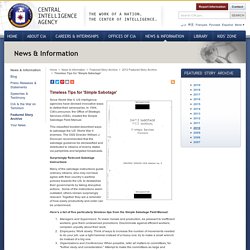
If you have information you think might interest CIA due to our foreign intelligence collection mission, there are many ways to reach us. If you know of an imminent threat to a location inside the U.S., immediately contact your local law enforcement or FBI Field Office. For threats outside the U.S., contact CIA or go to a U.S. Embassy or Consulate and ask for the information to be passed to a U.S. official. Please know, CIA does not engage in law enforcement. In addition to the options below, individuals contact CIA in a variety of creative ways. If you feel it is safe, consider providing these details with your submission: Reegle Thesaurus. REEEP project and policy datasets - LOD Developer guide - Clean Energy Information Portal - reegle.
There are two possibilities to access the data: As Linked Open Data Via the public SPARQL endpoint.
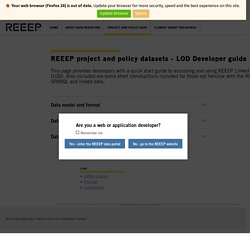
Module: Introduction to Ontology Based Data Access. The Optique platform is built on Ontology Based Data Access (OBDA), a technology for providing uniform access to data stored in heterogeneous sources.
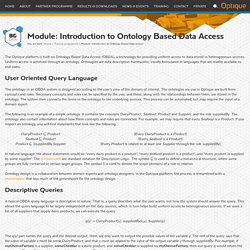
Uniform access is achieved through an ontology. Ontologies are data description frameworks, usually formulated in languages that are readily available to end users. User Oriented Query Language The ontology in an OBDA system is designed according to the user’s view of the domain of interest. The ontologies we use in Optique are built from concepts and roles. Natural language processing - OpenCog. This page describes the current state of affairs and future plans for natural language processing (NLP) within OpenCog.
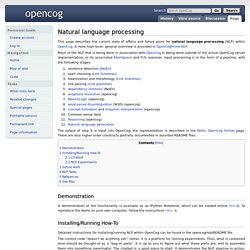
A more high-level, general overview is provided in OpenCogPrime:NLP. Much of the NLP that is being done in association with OpenCog is being done outside of the actual OpenCog server implementation, or its associated AtomSpace and PLN reasoner. Meta-Optimizing Semantic Evolutionary Search - OpenCog. Meta-optimizing semantic evolutionary search (MOSES) is a new approach to program evolution, based on representation-building and probabilistic modeling.
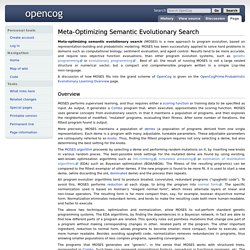
MOSES has been successfully applied to solve hard problems in domains such as computational biology, sentiment evaluation, and agent control. Results tend to be more accurate, and require less objective function evaluations, than other program evolution systems, such as genetic programming or evolutionary programming . Best of all, the result of running MOSES is not a large nested structure or numerical vector, but a compact and comprehensible program written in a simple Lisp-like mini-language. Link Grammar. News July, 2018: link-grammar 5.5.1 released!
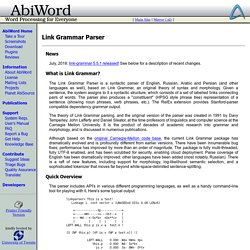
See below for a description of recent changes. What is Link Grammar? The Link Grammar Parser is a syntactic parser of English, Russian, Arabic and Persian (and other languages as well), based on Link Grammar, an original theory of syntax and morphology. Given a sentence, the system assigns to it a syntactic structure, which consists of a set of labelled links connecting pairs of words. The theory of Link Grammar parsing, and the original version of the parser was created in 1991 by Davy Temperley, John Lafferty and Daniel Sleator, at the time professors of linguistics and computer science at the Carnegie Mellon University. Although based on the original Carnegie-Mellon code base, the current Link Grammar package has dramatically evolved and is profoundly different from earlier versions. Quick Overview. Jonnydubowsky/glextrusion: OpenGL 3D extrusion library. Jonnydubowsky/relex: English Dependency Relationship Extractor.
RDF (Resource Description Framework) – A natural semantic fit - SciBite. VOCabs DataSheet 2018. Kusp DataSheet 2018. The core model. Curapersona/wordnet-3.0-rdf: The linked open dataset described at and the tools used to create it. p1285. Geovisualizer voila16. LinkLion - A portal for link discovery. Le Corail de Darwin - Welcome. Edge.org. The phrase "news that stays news" was originally how Ezra Pound, in 1934, defined literature—and so it's interesting to contemplate what, in the sciences, might meet that same standard.
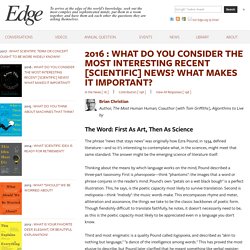
The answer might be the emerging science of literature itself. Thinking about the means by which language works on the mind, Pound described a three-part taxonomy. Semantic Technology Research Projects - Ontotext. Semantic Annotation - Tag Metadata in Text - Ontotext. Semantic annotation is the process of attaching additional information to various concepts (e.g. people, things, places, organizations etc) in a given text or any other content.
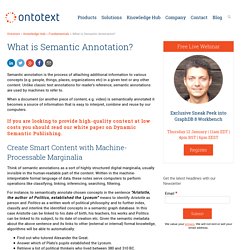
Unlike classic text annotations for reader’s reference, semantic annotations are used by machines to refer to. When a document (or another piece of content, e.g. video) is semantically annotated it becomes a source of information that is easy to interpret, combine and reuse by our computers. If you are looking to provide high-quality content at low costs you should read our white paper on Dynamic Semantic Publishing. Folksonomy. Hey Zuck, We Built Your Office A.I. Solution - Algorithmia. Module3 crowdsourcing. Refs. Image 2016-12-28 at 5.13.08 AM.png. SA systems pre print lundberg. 4. 1. Module 2 advanced jape. Module 2 jape. Module 1 ie and eval. Module 1 introduction to gui. An Error Has Occurred! Marine Metadata Interoperability. ESIP Community Ontology Repository (portal 3.1.3)
Welcome to the NCBO BioPortal. NCBO's BioPortal. Overview BioPortal is an open repository of biomedical ontologies, a service that provides access to those ontologies, and a set of tools for working with them.
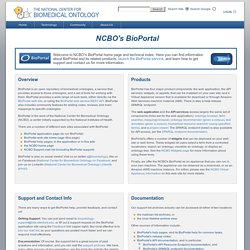
BioPortal provides a wide range of such tools, either directly via the BioPortal web site, or using the BioPortal web service REST API. BIoPortal also includes community features for adding notes, reviews, and even mappings to specific ontologies. BioPortal is the work of the National Center for Biomedical Ontology (NCBO), a center initially supported by the National Institutes of Health. Marine Metadata Interoperability. Marine Science and the Semantic Web MMI has long considered a semantic component critical to enabling the highest levels of data interoperability.
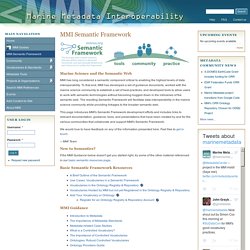
To that end, MMI has developed a set of guidance documents, worked with the marine science community to establish a set of best practices, and developed tools to allow users to work with semantic technologies without becoming bogged down in the intricacies of the semantic web. The resulting Semantic Framework will facilitate data interoperability in the marine science community while providing linkages to the broader semantic web. This page introduces MMI's Semantic Framework development efforts and includes links to relevant documentation, guidance, tools, and presentations that have been created by and for the various communities that collaborate and support MMI's Semantic Framework.